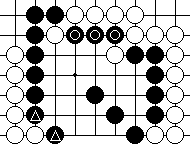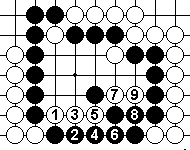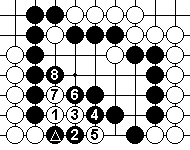
Home > Steve > Go > Problem of the month

Usually Black plays 4 here.
If there is already a black stone to the right of 4, how far away can it
be and permit him to omit "4"?

In this example does Black need to protect the cutting point between the two triangle stones, does he need to protect his three circle stones, or is he free to take sente elsewhere?

If there is a Black stone at any of the lettered points then Black may tenuki. (A,B,C are obvious and may well have resulted in a different sequence of play in the first place.)

With a Black stone one to the right of 'F' in Dia 3, the Black tenuki is a big mistake.
Note that even when there is a stone at 'D', 'E' or 'F' that the
possibility of a tenuki depends on the stability of the rest of Black's
stones.
It assumes that the stones forming the wall on the left are secure, that
the stones running along the first line connect to a secure base and
that there is no room for White to live or escape away from the edge.

Black should play to protect the cutting of the ![]() stones in Dia 2
with 1 here.
stones in Dia 2
with 1 here.
The circled stones of Dia 2 are not a problem.
This diagram shows the problem of playing elsewhere. (Obviously if the
'elsewhere' is truly sente and Black gets to return to this cutting
point before White does then he can play that way.)

This shows the sequence that inspired this problem.
I was playing Brian Timmins (2kyu) and thought my cutting point was
safe. I answered 1 at 2 before I realised that it wasn't safe, and this
shows the sacrifice of my two stones (at ![]() and 2) for the good of the whole
group.
and 2) for the good of the whole
group.
Home >
Steve >
Go >
Problem of the month
British Go Association
Last updated 2004-08-10
This page is part of http://www.stocton.org/
Email: webmaster@stocton.org